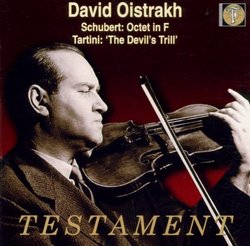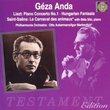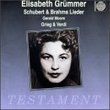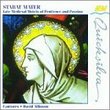| All Artists: Schubert, Tartini, Oistrakh Title: Octet / Devil's Trill Members Wishing: 0 Total Copies: 0 Label: Testament UK Release Date: 12/9/1997 Album Type: Import Genre: Classical Styles: Chamber Music, Historical Periods, Classical (c.1770-1830), Instruments, Strings Number of Discs: 1 SwapaCD Credits: 1 UPC: 749677111427 |
Search - Schubert, Tartini, Oistrakh :: Octet / Devil's Trill
 | Schubert, Tartini, Oistrakh Octet / Devil's Trill Genre: Classical
|
Larger Image |
CD DetailsSimilar CDs
|
CD ReviewsGreat music, Great performances Christopher Bonds | 11/06/2000 (4 out of 5 stars) "David Oistrakh was one of the 20th century's greatest violinists, as anyone who is interested in this CD already knows. On this recording he relinquishes the solo spotlight to become primus inter pares with 7 colleagues in a superb reading of Schubert's great Octet. The original recording dates from 1955 and is remastered in quite good mono sound. The interpretation is straightforward, no-frills, and awesomely perfect in ensemble. Oistrakh's rhythmic articulations are an absolute marvel of precision. Unfortunately the recording of Tartini's "Devil's Trill" Sonata lacks the first movement. No explanation is given. The original recording of the Tartini was produced by Walter Legge of EMI in 1957. I am almost certain Oistrakh would have recorded the entire work, and I suspect Testament's producer of the omission. Since the CD clocks in at 71:28, there probably wasn't enough room for the whole sonata. So why not pick another work? 5 Stars would have been my rating had not this movement been left off." A rare opportunity to hear the great Soviet violinist in cha Discophage | France | 12/30/2006 (3 out of 5 stars) "David Oistrakh, arguably the greatest soviet violinist of the 20th century, is better documented and hence better remembered as a soloist of concertos and a partner of violin and piano sonatas, than for his activities as a string quartet leader (Doremi has reissued recordings of Beethoven's "harp" quartet and Brahms' first string quartet, Tchaikovsky's first quartet, and clarinet quintets of Brahms and Mozart: David Oistrakh Collection, David Oistrakh Collection, Vol. 1 and David Oistrakh Collection, Volume 2). For all these details and more I refer you to the invaluable (but not entirely complete) discography collated by Paul Geffen, which you will easily find with any search engine.
That discography shows that there had been an earlier recording of Schubert's octet with the same personnel, made in 1950 for Melodiya (reissued in 2007 by Monopole: Franz Shubert : Octet / Antonio Vivaldi : Concerto for 2 Violins - David Oistach (CD)). This one dates from 1955 and was one of the few chamber music recordings made by Oistrakh and partners for HMV/EMI. Others include Schubert's piano trio opus 99 and Beethoven's Archduke, made in 1958 with pianist Lev Oborin and cellist Sviatoslav Knushevitsky (now available on a CD twofer from EMI: Beethoven, Schubert, Brahms: Chamber Works with Violin) - the cellist is also featured in the octet. Anyway, Testament's CD reissue of the octet gives us is a great and rare opportunity to hear Oistrakh as a string quartet leader, and they must be thanked for it. That said, I find myself somewhat disappointed with the interpretation. Granted, there are some great moments, and the 3rd movement's hunt-like music is among them. Though the recorded sound is a bit harsh, it is taken at a real "Allegro vivace" as Schubert prescribes, with all repeats played, and it exudes a fine atmosphere of carefree merriment. But the soviet musicians also apply a marked (and unprescribed) slow-down in the middle trio and mold the music with excessively plaintive phrasings. The Finale's slow introduction is taken at a very spacious tempo and given a fine sense of pent-up drama, and the ensuing Allegro is urgent, vigorously accented and full of boisterous zest. There are some good things also in the 4th movement's theme and variations (laudably taken with repeats): the theme and 1st and 2nd variations do not linger and are well accented and zestful, 3rd and 4th variations are more relaxed and lyrical (with wonderful cello playing from Knushevitsky in the latter), and the 7th , with its dialogue of violin and winds, is full of character. But the recorded perspective favors (sometimes unduly) Oistrakh's violin over winds. His tone is unfailingly mellow - sometimes too much so, I think, as in variation 3, where one would like more nerve. But the tango-like 5th variation is very typical of this versions' flaws: it is taken at a the slowest tempo I have ever met, and the music is consequently given a patrician character - an approach which, if anything, has the merit of originality; but I find that the music loses all its dramatic impact in the process. And there lies the rub. The Soviet group is prone to adopting slow tempos and to giving the music a mellow and plaintive character, which robs it of much of its drama. Witness their first movement: after a spacious and solemn introduction (so much so that the tempo relationship with the return of the introduction music at 7:30 is entirely lost), the Allegro - taken without repeat, which was the custom in the LP era - is relaxed and elicits a sense of charm, even of wistful romanticism, but it is also rather heavy-footed and lacks tension and bite. The recording engineers appear to have tried to solve the composition's instrumental balance difficulties by placing hornist Jacov Shapiro very far at the back of the room (try his solo at 3:24, or the 4th movement's 3rd variation at 3:28), and the passage between 5:19 and 5:31, with its suddenly duller and lackluster sound, seems patched from another session - from the 1950 recording, might I surmise? Schubert's tempo indication "Adagio" for the next movement allows for the very slow tempo adopted by Oistrakh and partners - it is by a margin the slowest I have heard among the more than 15 versions I have, and the opposite pole from the swift and somewhat unfeeling Vienna Octet -, but, at that tempo, the violinist's phrasings impart the music a sense of lingering plaintiveness that I do not find very convincing. Worse still, what the approach should not have allowed is for the loss of the characteristic 6/8 meter lilt. Here, each 8th note is equally accented, which give the music a very pedestrian, even plodding gait. Horn even seems to doze off at 6:27 and is slightly off-sync with violin, and the same happens to bassoon at 8:38. Vladimir Sarokin's clarinet tone is also undistinguished, and sometimes evocative of an accordion playing in its upper registers (that tonal peculiarity is also much in evidence in the 4th movement's variations). For an effective reading of this movement at a slow tempo, try the Berliner Solisten on Teldec, overall an excellent version on modern instruments (Schubert Octet in F Major Berliner Solisten or Franz Schubert: Octet in F Major, D.803). And likewise, the 5th movement's Menuetto is taken (with all repeats) at a plodding gait and with mellow accents, gaining a slightly nostalgic atmosphere but losing its character of a sprightly march - here it sounds more like an after-lunch digestive stroll of Mister and Madame Oistrakh with the baby. The statement that Tartini's first movement is missing, though confirmed in Geffen's discography, is puzzling - as it is blatantly false! It unfolds ("Larghetto affetuoso"), at a very slow tempo, from begining to 2:47, duly followed by the 2nd movement "tempo giusto" and then the third movement, the "Devil's trill" proper, at 5:38. But since my CD times 74:10, maybe Testament later reissued it complete. In sum, this release is of interest mainly to the Oistrakh devotee. Those looking for a good version of Schubert's octet should look elsewhere. My favorites are on period instruments: Hausmusik (Schubert: Octett), L'Archibudelli (Schubert: Octet L'Archibudelli & Mozzafiato), the Academy of Ancient Music (Schubert: Octet in F Major D803). " |

 Track Listings (7) - Disc #1
Track Listings (7) - Disc #1



